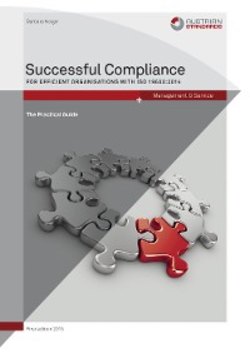Читать книгу Successful Compliance - Barbara Neiger - Страница 17
1.3.2Compliance Management Systems
ОглавлениеManagement systems create a framework for the uniform, goal-oriented alignment of an organisation through the design of structures, rules and procedures and the continuous monitoring and improvement of all activities. As shown below, both national and international legal systems contain provisions that organisations have an (implicit) duty to supervise and control their activities to ensure compliance with the law. With some exceptions, however, there are no regulations on how these governing and control measures are to be designed. In particular, there is no statutory regulation applicable to all organisations that require the introduction of a compliance management system (CMS).
On an international level, compliance management systems have been developed in the financial sector to combat money laundering.[33] This is also the case in Austria. Organisations that are subject to the Securities Act are obliged, in accordance with § 18 of the Securities Supervision Act (WAG), to permanently employ a compliance function charged with monitoring and performing regular appraisals of the adequacy of prescribed procedures and the implementation of measures to address any shortcomings. In the context of anti-corruption provisions the standard for compliance management systems is set in the USA and the UK. In both countries, an adequate and effective compliance and ethics program can affect prosecution, albeit to varying degrees.
The US Foreign Corrupt Practises Act (FCPA)[34] of 1977 was the world’s first anti-corruption law which introduced the concepts of corporate liability, liability for third parties and extraterritorial jurisdiction for corruption offences. The FCPA is increasingly being enforced with virtually global jurisdiction and is therefore highly relevant to all organisations whose activities can be seen in the context of the United States. The US Department of Justice (DOJ)[35] and the US Securities and Exchange Commission (SEC)[36] are entrusted with enforcement measures and can take the adequacy of a compliance programme into account when sentencing.
The principle of corporate liability for corrupt conduct by members of the company management, by employees, agents or subsidiaries acting on behalf of a company was introduced in the UK by the UK Bribery Act of 2010.[37] The UK Bribery Act provides for similar global jurisdiction to that in the FCPA. However, in contrast to the FCPA, the UK Bribery Act gives organisations the possibility of protecting themselves from prosecution if they can prove that they have put appropriate measures in place within their organisation to prevent bribery.
Many recognised international institutions have published principles for anti-corruption compliance programmes and/or individual elements thereof. A good summary can be found in the “Anti-corruption Ethics and Compliance Handbook for Business” published in 2013 by the OECD in cooperation with the UNODC and the World Bank.[38] In this context, probably the oldest rules drawn up to combat corruption are those issued by the International Chamber of Commerce (ICC) in 1977[39] (currently published in their 5th edition, 2011). As the ICC maintains one of the most prestigious international courts of arbitration, these rules are of considerable importance to companies operating in international trade.
